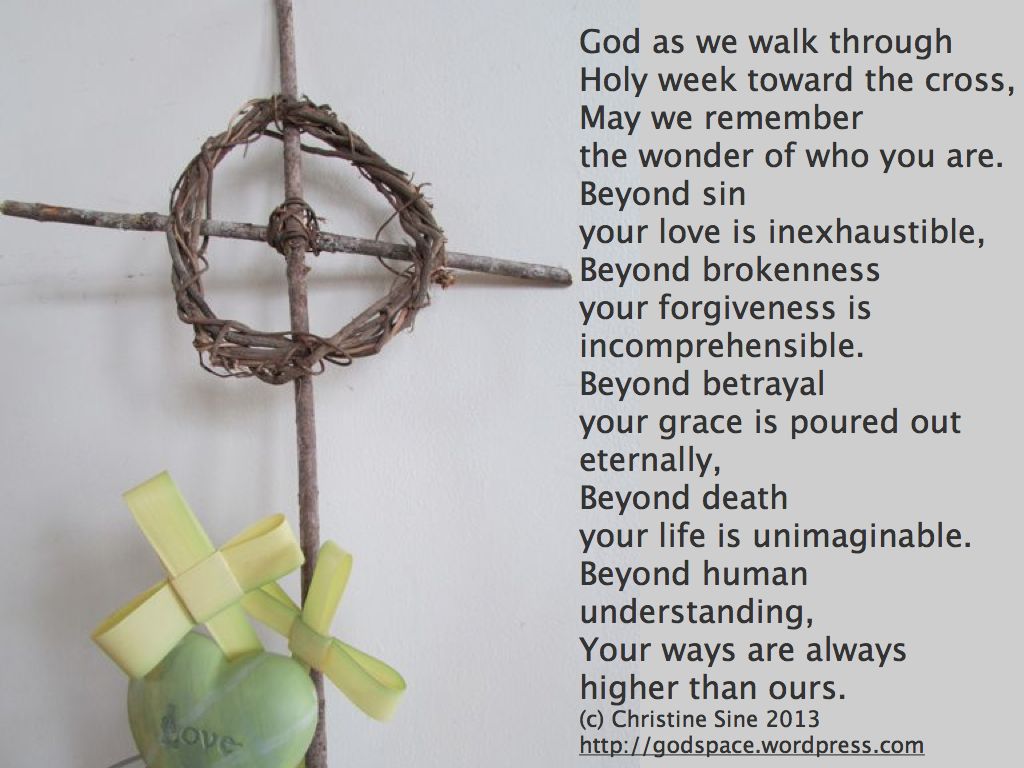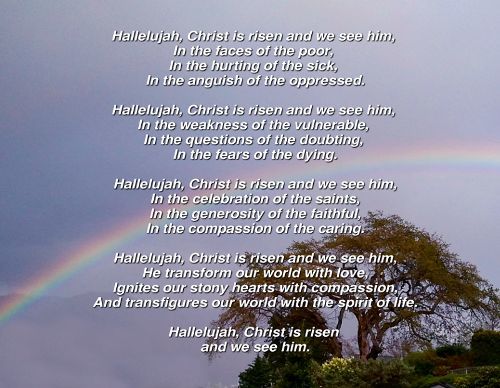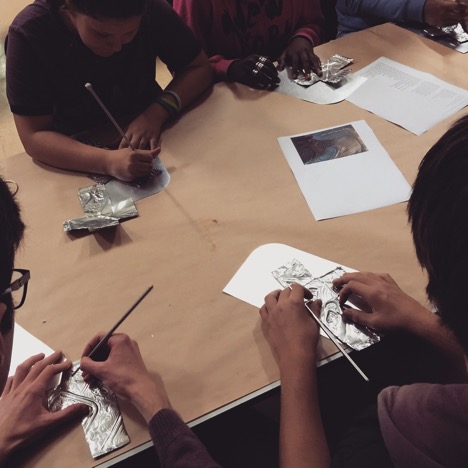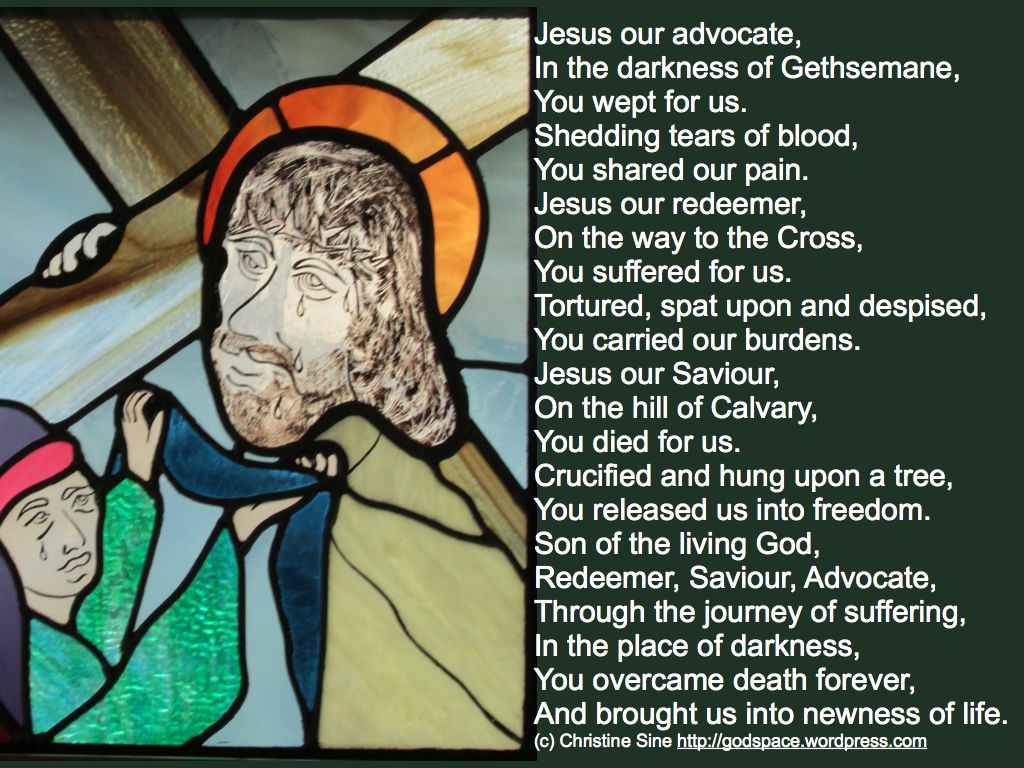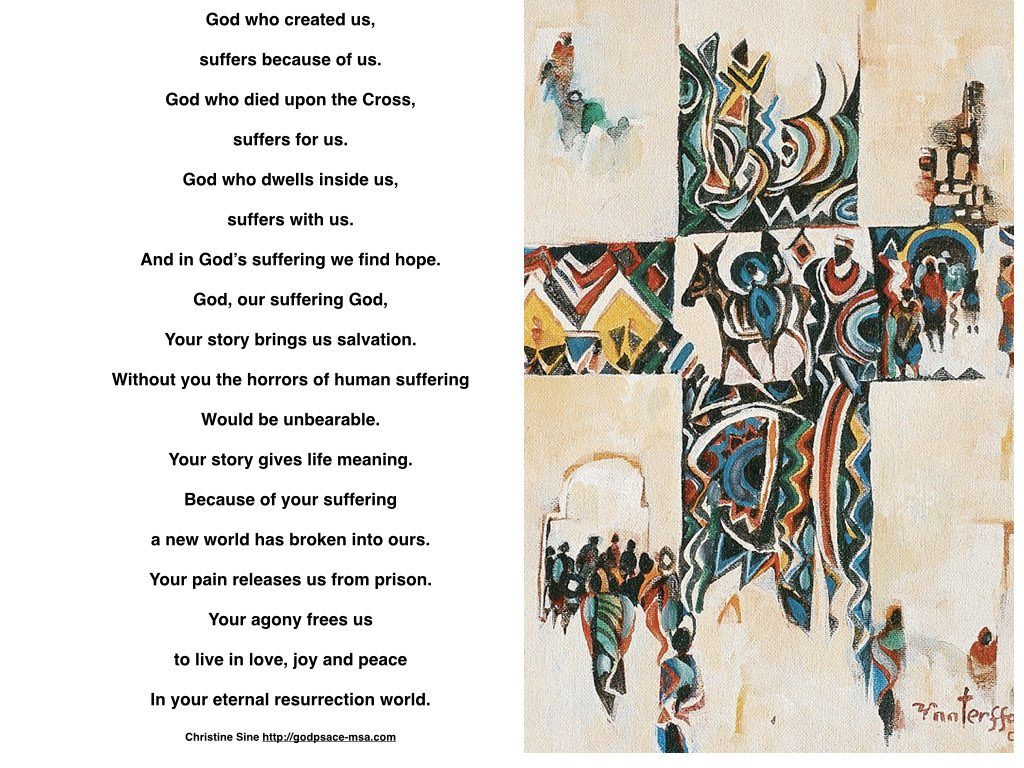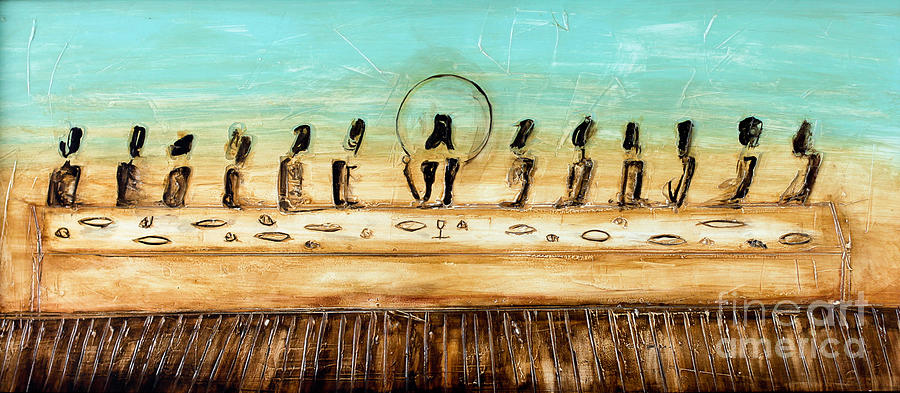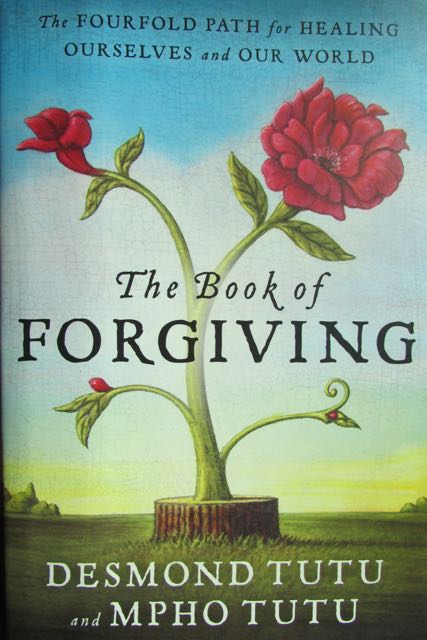
No one knows more about the need to forgive than Archbishop Desmond Tutu. Writing with his daughter, Mpho, in The Book of Forgiving, he lays out about the simple but profound truths about forgiveness and provide a pathway to assist us to accomplish it. They remind us:
Forgiveness is how we bring peace to ourselves and our world.
The Tutu’s bring the practicalities of forgiving to life with the promise that forgiveness is good for you. This book will lead readers to healing of affronts, injuries and old hurts and open pathways to a fuller life. They know from deep personal experience that when you forgive you become an extraordinary person.
This book is my reading for Holy week. It is both refreshing and healing to read the stories and perform the exercises at the end of each chapter. This is not a book to be taken lightly, or one to be read rapidly. It is more a journey than a book and a journey that I heartily recommend to you.
The authors suggest that the reader get a journal specifically to use while reading the book, something which takes both time and discipline. Yet it profoundly enhances the experience and will, I am sure contribute to the healing of each person who makes this commitment.
They also suggest finding a stone “small enough to carry in the palm of your hand and large enough that you won’t lose it” This stone becomes the focal point for a series of spiritual exercises. I am loving this refreshing approach which is simple yet deeply impacting. I hope that you will join me in this journey of forgiving.
Jesus’ ride into Jerusalem was obviously headed for a collision with the powerful Roman empire – a collision that would cost him his life and change history forever. Jesus triumphal entry into Jerusalem may have begun with crowds shouting Hosanna but it ends with Good Friday and shouts of “crucify him”. It doesn’t end with a gold crown but with a crown of thorns. (Read entire article)
It’s Holy week and Jesus’ journey towards the cross has begun. Most of us know that Palm Sunday commemorates Jesus’ triumphant procession into Jerusalem on donkey’s back but few of us are aware of the deeper and very subversive implications of this event. As we walk through holy week towards the cross, Jesus’ actions become more and more subversive. We have in fact entered the most subversive week of Jesus’ life.
Jesus’ radical procession thumbed its nose at the Roman Empire with its power and wealth. Then he headed to the temple, overturned the tables and threw out the moneylenders proclaiming loud and clear to the religious leaders that their alignment with the power of Rome was totally unacceptable to God. He caps the week off with a Passover meal, not revealing himself as an emperor messiah his followers hoped for, but washing feet, indelibly imprinting on his disciples this final image of a slave, the last loving act of an upside down king.
What is Your Response?

Aboriginal Christian art – Alice Springs
As we walk from Palm Sunday to Good Friday, where is your allegiance? Take some time to sit quietly in the presence of God and evaluate your commitment to this servant Christ. All of us follow Jesus with mixed motives. In what ways do you truly follow Jesus, fully aware that you are on a collision course with the values of our secular culture? In what ways do you only follow Jesus for wealth, power and happiness? What changes might God ask of you as you walk with Jesus towards Jerusalem and the Cross?
“When a man finds that it is his destiny to suffer… his unique opportunity lies in the way he bears his burden.” Victor Frankl
Jesus’ triumphal entry ends on the Cross as he takes into himself all the pain and suffering of our world so that together we can celebrate the beginning of a new procession on Easter Sunday – a procession that leads us into God’s banquet feast and the wonder of God’s eternal world.
There is no concise reading of the events of Holy Week in the gospels. In all gospels, they spread over several chapters. Take time this week to read through the events of Holy Week as recorded in John 12-20. You might like to read a chapter each day as we walk through this week and listen to the Gungor video below as you do so. The message of Easter is that God is making all things new. Resurrection is in the air.
Take some time each day this week to sit quietly and contemplate this last week of Jesus life. Immerse yourself in his pain, but look beyond that to the resurrection. Remind yourself that the focus is not death but resurrection. What comes to mind as you think about this? What subversive steps might Jesus ask you to take in order to follow him to the Cross and beyond? Are there ways that you need to resist the wealth and power of our culture in order to follow?
As we think about Easter Sunday, my thoughts focus on the hope and long for God’s eternal world that we glimpse so dimly at the moment. We are prisoners of hope, believing that one day God’s resurrection will break into our world in all its fullness.
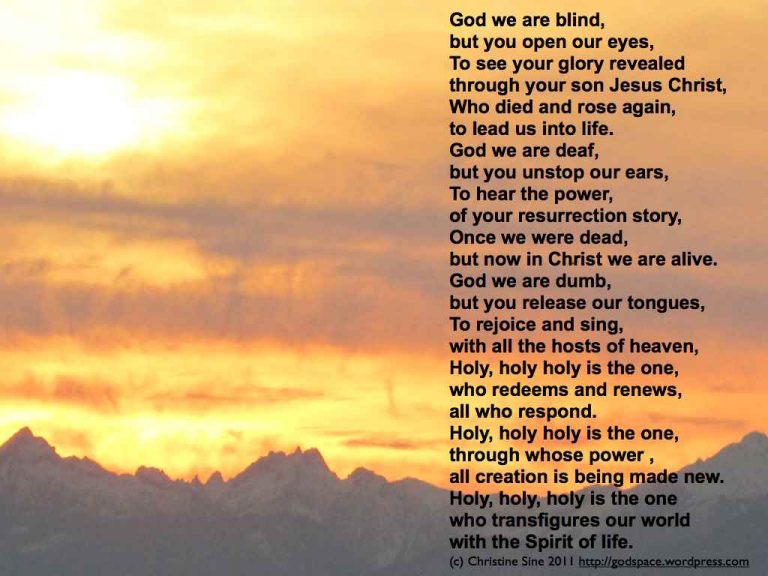 Hold your head high, Christ has risen.
Hold your head high, Christ has risen.
Rejoice and shout,
Christ has come calling us home.
Home to the heart of God,
Home to God’s living presence,
Home to God’s banquet feast.
Hold your head high, Christ has risen.
Death has been conquered,
Christ has come calling us home.
All that was broken has been made whole,
All that was dislocated has been set right,
All that was oppressed has been set free.
Hold your head high, Christ has risen,
Bringing God’s healing,
Christ has come calling us home.
Redemption is complete,
God’s eternal world has begun,
Love reigns over all,
Hallelujah, Hallelujah, Hallelujah,
Christ has risen calling us home.
Christ is Risen: The world below lies desolate
Christ is Risen: The spirits of evil are fallen
Christ is Risen: The angels of God are rejoicing
Christ is Risen: The tombs of the dead are empty
Christ is Risen indeed from the dead,
the first of the sleepers,
Glory and power are his forever and ever
St. Hippolytus (AD 190-236)
Easter at Home
- How to Make Easter Memorable and COVID-Friendly
- Watch The Messiah performance online through The Tabernacle Choir
- 7 Easy Steps from FamilyLife – great for kids!
- Crosswalk has some helpful hints for celebrating with kids as well.
- Keeping Easter Special on a budget and at home – Medium Sized Family.com
Prayers and Resources
- Easter Prayers from Jon Birch at Faith and Worship
- Easter resources from Textweek.com
- The Easter Vigil explanation and service by Bosco Peters.
- Easter Litany from re:worship.
- A great collection of resurrection images with links to other series of images of Christ’s life.
- Wonderful images from India of Holy Week
- And another of art from Japan for Holy Week
Music to Reflect On
First from Taize community:
Let nothing disturb you
Let nothing disturb you,
let nothing frighten you,
everything passes,
A beautiful Celtic Alleluia
Sheila Hamil shared these videos with us for the Easter Season (used with permission):
A couple of my favourite Easter hymns:
And a very different Hallelujah by Leonard Cohen – well worth reflecting on at this season.
Check out the other posts for Holy Week on our Lent & Easter page.
Holy Week is coming, and we are getting ready to walk with Jesus towards the cross. The following creative project is one I found here. It is designed for kids, but I am using it this week as a meditative practice. Each step provides an opportunity to pause and contemplate the events of the Easter journey and allow God to speak us afresh through the story.
Supplies:
- Cardboard (cut 6 ½” x 9”)
- Pencil or marker.
- Yarn
- White glue
- Tinfoil
- Scissors
- Paint brush
- Water
- Tape
- Colored permanentmarkers
- Black Sharpie
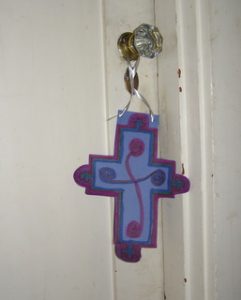
Directions:
- With the pencil, draw a Good Friday scene on the cardboard as suggested here:. Be sure your spaces aren’t too small. Starting with the cross, run a bead of white glue over the pencil marks. Then cut and glue pieces of yarn over the glue. Glue and place yarn over all the lines in the picture. Now read through one of the gospel accounts of the crucifixion. Contemplate your unfinished picture in the light of the story. What is God saying to you?
- Cut a piece of aluminium foil that is about two inches wider and two inches longer than your picture. On the dull side of the tinfoil, run lines of white glue around the edges and through the center of the tinfoil. With the paint brush that has been dipped in water, spread the glue completely over the back of the foil.Now center the picture, yarn side down, over the aluminium foil and fold the edges of the tinfoil to the back of the picture and tape the corners. With your finger, press over the front of the foil-covered picture, sliding your thumb close to the yarn. Read through the story again, perhaps from a different gospel. What stands out for you as you contemplate your unfinished picture?
- With the colored permanent markers, fill the spaces in with color. I found that it works best to outline the space with the chosen color and then using the marker, sort of on its side, to fill in the area. Run over the raised area (yarn) with the black marker. Read through the third gospel account of the crucifixion. Contemplate your completed picture. What is God saying to you
This page is out of date. Please see our updated Good Friday Resources.
Over this last week, I have been posting prayers, liturgies and worship resources for Holy week. I have already posted resources for Stations of the Cross but here are some additional resources for Good Friday that I thought you might enjoy. I have interspersed them with images of the crucifixion from different cultures as I find reflecting on these remind me that Christ died for all cultures and all nations.
Posts and Resources
- This post from Lilly Lewin: Freerange Friday: A Good Friday TakeAway has some great ideas for Good Friday.
- Also, consider downloading her Experiential Stations of the Cross.
- Scott Erickson Art shares resources for Good Friday services including Stations of the Cross.
- Take time this week to go through the sessions in the Lenten retreat: Women of the Passion at Sacred Space. “A retreat offers a chance to take a step back from the pressure of daily life, to reflect prayerfully on the current state of your relationships: with God, with the people around you, and with the world.” Very powerful!
- And if you don’t know what Good Friday is about check this.
- Crosswalk.com also provides a great history and readings for Good Friday.
- If you want to get creative: Make a Tiffany Style Cross.
- Lent and Beyond has just updated their Good Friday quotes, poems, prayers and hymns and other resources including music and devotionals for Good Friday.
- Textweek.com is always alive with wonderful resources for the season
- And from Bosco Peters in N.Z. a Good Friday liturgy
- Gone is the Light is a powerful reflective song by Steve Bell.
- Many Godspace contributors love to write prayers for each of the significant days during Easter week. Here are some that we have written in the past.
- What’s So Good About Friday – Rowan Wyatt
- This is my 2015 Good Friday Prayer:
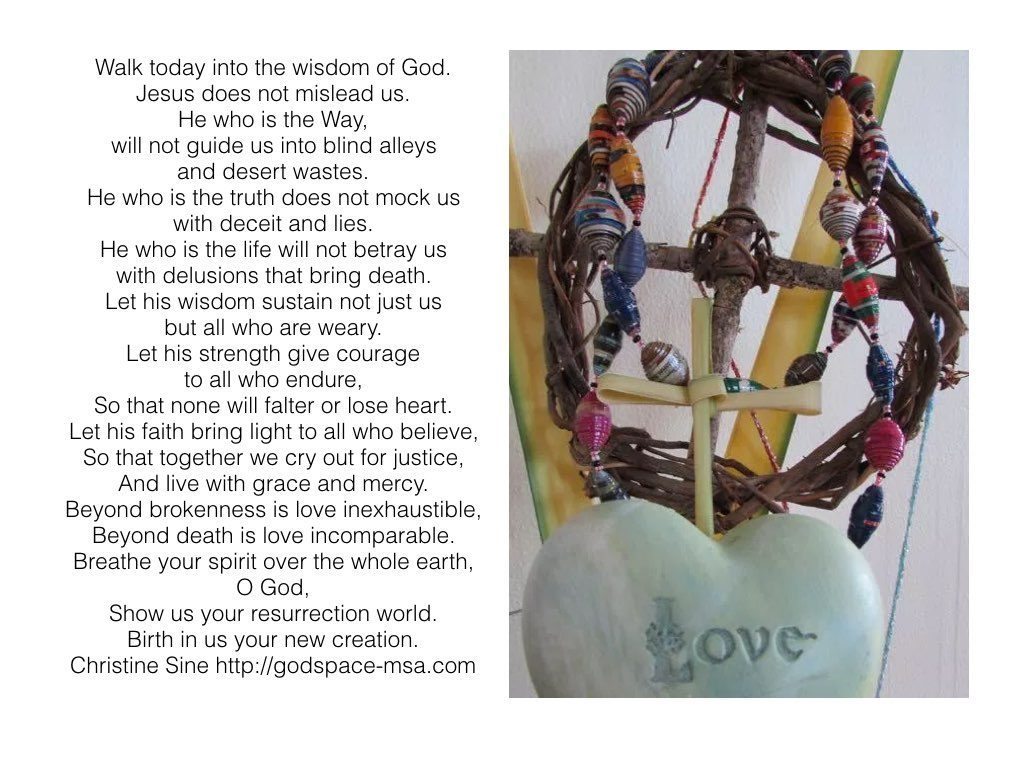 This is the first Good Friday prayer I wrote and still one of the most popular.
This is the first Good Friday prayer I wrote and still one of the most popular.
The following is part of a liturgy I wrote that I often return to:
Jesus you took bread and broke it,
You shared it with your friends.
As you were broken to feed us with the bread of life.
Jesus you took wine and poured it out,
Grapes crushed and drained of life.
As you were crushed and drained of your life blood.
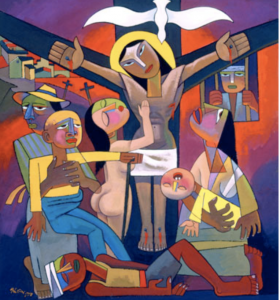
Crucifixion Art by He Qi
Here is part of a longer liturgy designed for church or small group use:
Today we walk with Christ in the dark shadow of the cross,
Knowing we have weighed him down,
Our burdens crushed his shoulders,
His suffering is for us,
For us he willingly endured death.
Let us trust in God alone,
And walk the way of the cross together,
Let us move forward without fear into God’s eternal purposes.
Then we will never know disgrace,
And we will learn to praise our God who never abandons us.
Please check out our complete list of Godspace resources for Lent through Holy Week.
The following prayer may seem like an unusual one to publish as a Lenten prayer but Lent is meant to be about re-evaluating our life focus and more than that about reconciling ourselves to the love of God as I mentioned in the post United by Love Not Doctrine.
Recognizing the depth of God’s love as it is expressed in the story of Jesus walk towards the Cross, falling in love with this God whose love has not limits, really does change everything in a way that is totally transformative of our lives.
The prayer is attributed to Father Pedro Arrupe (1903- 1991) from the Basque region of Spain who became the 28th Superior General of the Society of Jesus. I was first given this prayer on a card several years ago but have recently also come across it on Ignatian Spirituality.com
Nothing is more practical than finding God, that is,
than falling in love in a quite absolute final way.
What you are in love with,
what seizes your imagination,
will affect everything.
It will decide what will get you out of bed in the morning,
what you do with your evenings,
how you spend your weekend,
what you read, who you know,
what breaks your heart,
and what amazes you with joy and gratitude.
Fall in love,
stay in love,
and it will decide everything.
This page is out of date. Please see our updated Maundy Thursday Resource here.
Today, I am focusing on resources for Maundy Thursday, the day before Good Friday, which commemorates Jesus’ last Supper with the disciples and the institution of the Eucharist. Its name of “Maundy” comes from the Latin word mandatum, meaning “command.” This stems from Christ’s words in John 13:34, “A new commandment I give unto you. Love one another as I have loved you”. Many of us associate it with foot washing:
A rite performed by Christ upon his disciples to prepare them for the priesthood and the marriage banquet they will offer, and which is rooted in the Old Testament practice of foot-washing in preparation for the marital embrace (II Kings 11:8-11, Canticles 5:3) and in the ritual ablutions performed by the High Priest of the Old Covenant (contrast Leviticus 16:23-24 with John 13:3-5). The priest girds himself with a cloth and washes the feet of 12 men he’s chosen to represent the Apostles for the ceremony. Read more
It is the oldest of the observances peculiar to Holy Week but seems to have attracted the least attention and I must confess creative suggestions were hard to come by.
Free Maundy Thursday Resource
 Our own church, Saint Andrews Episcopal Church in Seattle, hosts an Agape feast and foot washing, one of the most beautiful celebrations I have been to. We re-enact the Last Supper with a wonderful lamb feast, beautiful litany that intertwines scripture and prayer, have the opportunity to wash each other’s feet and then process upstairs to the sanctuary to strip the altar for Good Friday. They have kindly made the liturgy for this celebration available for FREE DOWNLOAD from the Godspace resource centre.
Our own church, Saint Andrews Episcopal Church in Seattle, hosts an Agape feast and foot washing, one of the most beautiful celebrations I have been to. We re-enact the Last Supper with a wonderful lamb feast, beautiful litany that intertwines scripture and prayer, have the opportunity to wash each other’s feet and then process upstairs to the sanctuary to strip the altar for Good Friday. They have kindly made the liturgy for this celebration available for FREE DOWNLOAD from the Godspace resource centre.
Foot Washing
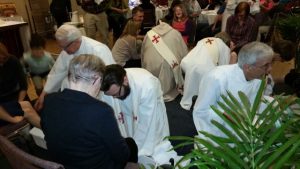 Foot washing has also taken on new significance for me in recent years as I reread two posts that have been contributed to my blog. Some of you might like to revisit these too.
Foot washing has also taken on new significance for me in recent years as I reread two posts that have been contributed to my blog. Some of you might like to revisit these too.
- The Dirty Job of Special Needs Parenting by Barbara Dittrich
- Living Into the banquet Feast of God
- I also love this post Replacing Holy Week – Towards a Public + Local Liturgy by Brandon Rhodes. and suggest that you also watch this video Brandon put together that spells our some of what they have done since then the concretize their practices.
- Parish Practices: “Re-Placing Holy Week,” with Brandon Rhodes from Parish Collective on Vimeo.
- One form of service you might like to consider for either Maundy Thursday or Good Friday is a Tenebrae service. I like this resource from the Calvin Institute of Christian Worship that helps explain this.
- And an “alternative service from UMC that has some creative ideas here.
- Another creative suggestion is what this Christian school in England did – not just washing feet but cleaning the neighbourhood.
- Or check out the Maundy Thursday resources at re:Worship and those at Textweek.com
Other Customs
I have adapted other customs of Maundy Thursday here that you may like to consider for your own observances:
- Consider a Passover meal like the liturgy available for free above.
- In Germany, Maundy Thursday is known as “Green Thursday” (Grundonnerstag), and the traditional foods are green vegetables and green salad, especially a spinach salad. Consider planning a vegetarian Last Supper banquet for your celebrations and highlight the environmental issues you are concerned about.
- Visit a local homeless camp or home for the elderly (make sure you get permission first) and do foot washing and pedicures for the inhabitants.
- This is the traditional night for an all night vigil of prayer and meditation. Give yours a new twist by holding an all night reading of Dante’s Inferno as St Philips in the Hills Episcopal Church has done for the last 5 years.
- This is a day to reach out and help someone in a special way: consider looking after a child so that the mother could have a free evening, undertaking some mending or darning, humble, unostentatious things like that.
- Visit 3 or 7 local churches or other places of worship after (or before) your own service.
- In Mark Pierson’s Lenten devotional for 2013, he comments: Jesus, a king who acted like a slave. Perhaps on Maundy Thursday, you would like to consider a special way to reach out to those who are still in slavery.
- One symbol of Easter I grew up with that is not so common in the U.S. is hot cross buns which some think originated from a 12th-century English monk who placed the sign of the cross on the buns in honor of Good Friday. So if you want to have your hot crossed buns ready for Good Friday make them on Maundy Thursday, together with your family or community. Here is the recipe I use.
Celebrate with Kids!
- For those celebrating with kids, I rather liked this Fill Your Seder Plate game.
- Ideas for Worship at Home by Assoc. of Presbyterian Church Educators
So consider including this day in your Holy Week celebrations and if you do something creative let me know.
This is part of this series on Resources for Holy Week. Here are all the posts:
As an Amazon Associate, I receive a small amount for purchases made through appropriate links.
Thank you for supporting Godspace in this way.
When referencing or quoting Godspace Light, please be sure to include the Author (Christine Sine unless otherwise noted), the Title of the article or resource, the Source link where appropriate, and ©Godspacelight.com. Thank you!

